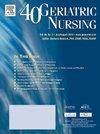有倾诉对象会影响老年人的死亡率吗?2008年至2018年的前瞻性队列研究
IF 2.5
3区 医学
Q3 GERIATRICS & GERONTOLOGY
引用次数: 0
摘要
目的研究中国老年人知己网络与死亡率之间的关系,重点研究知己网络缺失、知己网络类型和知己网络规模的影响。方法一项前瞻性队列研究纳入了2008 - 2018年中国纵向健康寿命调查(CLHLS)中11930名65岁以上的参与者。采用Cox比例风险模型进行分析,并辅以亚组分析和相互作用分析。结果调整混杂因素后,无知己网络的参与者死亡率较高(HR=1.194, 95% CI 1.097 ~ 1.300)。在知己网络的大小和死亡率之间观察到剂量-反应关系。值得注意的是,有配偶作为知己与死亡率降低密切相关(HR=0.765, 95% CI 0.677-0.865),而有正式助手作为知己对死亡率没有显著影响(HR=0.813, 95% CI 0.636-1.040)。结论识别和支持没有知己网络的老年人对于使他们从这些网络中受益并潜在地延长寿命至关重要。本文章由计算机程序翻译,如有差异,请以英文原文为准。
Does having someone to confide in affect mortality in older adults? a prospective cohort study from 2008 to 2018
Objectives
Our study investigated the association between confidant networks and mortality among older Chinese adults, focusing on the impact of the absence, types, and size of the networks.
Methods
A prospective cohort study included 11,930 participants aged over 65 from the Chinese Longitudinal Healthy Longevity Survey (CLHLS) from 2008 to 2018. Cox proportional hazards models were employed for analysis, supplemented by subgroup and interaction analyses.
Results
Participants without confidant networks had higher mortality (HR=1.194, 95% CI 1.097–1.300) after adjusting for confounders. A dose-response relationship was observed between the size of confidant networks and mortality. Notably, having a spouse as a confidant was strongly associated with decreased mortality (HR=0.765, 95% CI 0.677–0.865), whereas having formal helpers as confidants did not significantly affect mortality (HR=0.813, 95% CI 0.636–1.040).
Conclusion
Identifying and supporting older adults without confidant networks is crucial for enabling them to benefit from these networks and potentially enhance their longevity.
求助全文
通过发布文献求助,成功后即可免费获取论文全文。
去求助
来源期刊

Geriatric Nursing
医学-护理
CiteScore
3.80
自引率
7.40%
发文量
257
审稿时长
>12 weeks
期刊介绍:
Geriatric Nursing is a comprehensive source for clinical information and management advice relating to the care of older adults. The journal''s peer-reviewed articles report the latest developments in the management of acute and chronic disorders and provide practical advice on care of older adults across the long term continuum. Geriatric Nursing addresses current issues related to drugs, advance directives, staff development and management, legal issues, client and caregiver education, infection control, and other topics. The journal is written specifically for nurses and nurse practitioners who work with older adults in any care setting.
 求助内容:
求助内容: 应助结果提醒方式:
应助结果提醒方式:


